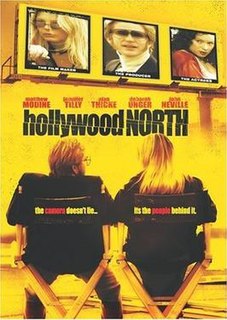Related Research Articles

The cinema of Mainland China is one of three distinct historical threads of Chinese-language cinema together with the cinema of Hong Kong and the cinema of Taiwan.

Hollywood North is a colloquialism used to describe film production industries and/or film locations north of its namesake, Hollywood, California. The term has been applied principally to the film industry in Canada, specifically to the areas of Toronto and Vancouver. The level of Canadian production has increased since the ratification of the Canada–United States Free Trade Agreement in 1988.

The film industry or motion picture industry, comprises the technological and commercial institutions of filmmaking, i.e., film production companies, film studios, cinematography, animation, film production, screenwriting, pre-production, post production, film festivals, distribution and actors, film directors and other film crew personnel. Though the expense involved in making films almost immediately led film production to concentrate under the auspices of standing production companies, advances in affordable film making equipment, and expansion of opportunities to acquire investment capital from outside the film industry itself, have allowed independent film production to evolve.
According to international organizations such as UNESCO and the General Agreement on Tariffs and Trade (GATT), cultural industries combine the creation, production, and distribution of goods and services that are cultural in nature and usually protected by intellectual property rights.

Happy Madison Productions is an American film and television production company founded in 1999 by Adam Sandler which is best known for its comedy films. In association with Happy Madison which takes its name from the films Happy Gilmore and Billy Madison, two box office successes starring Sandler himself, both produced by Robert Simonds. The elderly man depicted in the production logo is Sandler's late father, Stanley, who also says the accompanying audio, "Terrific."
Cultural exception is a political concept introduced by France in General Agreement on Tariffs and Trade (GATT) negotiations in 1993 to treat culture differently from other commercial products. In other words, its purpose is to consider cultural goods and services as exceptions in international treaties and agreements especially with the World Trade Organization (WTO). Its goals are to point out that States are sovereign as far as limitation of culture free trade is concerned in order to protect and promote their artists and other elements of their culture. Concretely, it can be seen through protectionist measures limiting the diffusion of foreign artistic work (quotas) or through subventions distributed according to the country's cultural policy.

Legendary Pictures Productions, LLC, doing business as Legendary Entertainment or simply Legendary, is an American film production and mass media company based in Burbank, California. The company was founded by Thomas Tull in 2000 and in 2005 concluded an agreement to co-produce and co-finance films with Warner Bros. and Universal Pictures. Since 2016, Legendary has been a subsidiary of the Chinese conglomerate Wanda Group.
Icon Productions is an independent production company founded in August 1989 by actor/director Mel Gibson and Australian producing partner Bruce Davey, which, unlike most other independent production companies, funds most of its development and production costs, allowing it to retain creative control of its projects. Its headquarters are in Los Angeles.

A co-production is a joint venture between two or more different production companies for the purpose of film production, television production, video game development, and so on. In the case of an international co-production, production companies from different countries are working together.

Ministry of Industry and Information Technology (MIIT) of the Chinese government, established in March 2008, is the state agency of the People's Republic of China responsible for regulation and development of the postal service, Internet, wireless, broadcasting, communications, production of electronic and information goods, software industry and the promotion of the national knowledge economy. The MIIT was also responsible for the nation's tobacco control, but this task will be assigned to a new health commission to be established as part of a broad governmental reshuffle.

The North Carolina Film Office, originally called the "North Carolina Film Commission," is a member of the Association of Film Commissioners International.

The Georgia Department of Economic Development (GDEcD) is a department of the State of Georgia. The department plans, manages and mobilizes state resources to attract new business investment to Georgia, drive the expansion of existing industry and small business, locate new markets for Georgia products, inspire tourists to visit Georgia and promote the state as a top destination for arts events and film, music and digital entertainment projects.
Screen NSW is an agency of the Government of New South Wales that assists, promotes and strengthens the screen industry in the state of New South Wales, Australia. The agency aims to promote Australia’s cultural identity, encourage employment in all aspects of screen production, encourage investment in the industry, enhance the industry’s export potential, encourage innovation and enhance quality in the industry.
Patricia Swinney Kaufman is the executive director of the New York State Governor's Office for Motion Picture and Television Development and the deputy commissioner of Empire State Development. Kaufman is the former president of the Association of Film Commissioners International, where she still serves on the board of directors. She is the secretary for the Hamptons International Film Festival and has also acted in some films directed by her husband, Lloyd Kaufman, the co-founder of Troma Entertainment.
The San Diego Film Commission is a nonprofit, government-funded office that promotes and facilitates film and television production in the city. Created in 1976 by mayor Pete Wilson, it was originally called the San Diego Motion Picture and Television Bureau.

The Mayor's Office of Film, Theatre & Broadcasting (MOFTB) is the oldest film commission in the United States. It is New York City’s agency responsible for coordinating municipal support for film and television production, including approving film shoots and liaising with government agencies and promoting the industry. The office provides free permits, free public locations, and free police escorts. It also provides shooting guidelines, insurance information, and other useful information for local film and media production. Built upon mayoral initiatives dating back to Mayor John V. Lindsay in 1966 and Mayor Abraham Beame in 1974, the Mayor’s Office today supports an industry that generates over $5 billion annually and employs over 100,000 New Yorkers.
Association of Film Commissioners International(AFCI) is worldwide network of more than 360 commissions from 40 countries on every continent except Antarctica. The AFCI represents trained, experienced and professional Film Commissioners and their offices and staff, sets standards and provides professional education, offers training and business services in the field of Film Commissioning, and provides regular marketing and network opportunities in Hollywood and around the world for Film Commissions.

The Virginia Film Office is a part of the Virginia Tourism Corporation located in Richmond, Virginia. The Virginia Film Office brings jobs and revenue to the Commonwealth by marketing the state as a location for film, television, and commercial production and by supporting and fostering Virginia's in-state production industry.
Cinema of the Democratic Republic of the Congo (DRC) originated with educational and propaganda films during the colonial era of the Belgian Congo. Development of a local film industry after the Democratic Republic of the Congo became independent in 1960 was handicapped by constant civil war.

The Australian Directors' Guild (ADG) is an industry guild representing the interests of film, television, commercials and digital media directors, including documentary makers and animators, throughout Australia. With its headquarters in Sydney, the ADG has branches in New South Wales, Queensland, South Australia, Victoria and Western Australia. Founded initially as the Australian Feature Film Director’s Association in September, 1981 and renamed the Australian Screen Directors Association four months later, the Guild became the Australian Directors Guild in 2007 in order to align itself more clearly to other international Directors Guilds which had for some years been strengthening their ties with each other and with their Australian counterpart. In 2014, the ADG membership voted unanimously for constitutional changes to enable the Guild to register as a trade union under Australia’s Federal Industrial Relations Act. In February, 2015 registration as an industrial organisation was approved by the Fair Work Commission.
References
- ↑ "New Hampshire Film and Television Office", Association of Film Commissioners International, Retrieved 2014-03-26.
- ↑ "New Hampshire Film & Television Office :: About Us", New Hampshire Film & Television Office, Retrieved 2014-03-27.
| This New Hampshire-related article is a stub. You can help Wikipedia by expanding it. |